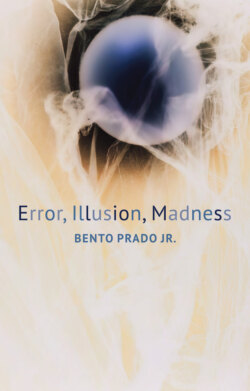Error, Illusion, Madness

Реклама. ООО «ЛитРес», ИНН: 7719571260.
Оглавление
Bento Prado Jr.. Error, Illusion, Madness
Table of Contents
List of Illustrations
Guide
Pages
Series Title. Critical South
Error, Illusion, Madness
Copyright Page
Dedication
Publisher’s Note
Quote
Foreword No Proper Place of Its Own Vladimir Safatle
Is there such a thing as a point of view of the periphery?
A common place without a proper grammar
Persuasion
Phusis
Notes
Preface
Notes
1 Error, Illusion, Madness*
I
II
III
IV
Error, Illusion, Madness. Commentary by Arley Ramos Moreno
Note
Notes
2 Descartes and the Last Wittgenstein The Dream Argument Revisited*
I
II
III
IV
Note
Notes
3 Wittgenstein Culture and Value*
I
II
III
IV
Note
Notes
4 The Plane of Immanence and Life
I
II
III
Acknowledgments
Translator’s note
Values and the Plane of Immanence. Commentary by Arley Ramos Moreno
Notes
5 Relativism as a Counterpoint*
I
II
III
IV
Bento Prado Jr.’s Lecture on Relativism. Commentary by Sérgio Cardoso
Neither Apel nor Rorty. Commentary by Paulo Eduardo Arantes
Note
Notes
6 On Deleuze An Interview*
Note
Notes
7 Bergson, 110 Years Later*
Note
Notes
Bibliography
Extras
Index
POLITY END USER LICENSE AGREEMENT
Отрывок из книги
The publication of this series is supported by the International Consortium of Critical Theory Programs funded by the Andrew W. Mellon Foundation.
Series editors: Natalia Brizuela and Leticia Sabsay
.....
However, one of Bento Prado’s major critical strategies consisted in inquiring into the structure of subjectivity presupposed by philosophical positions that wished to salvage some form of normativity immediately accessible to the subject. Such deconstructions of normativity, which went as far as claiming that the common person is no more than a “pedagogical project,” were in fact initial moves in a redimensioning of experience, since the abandonment of a normative horizon led to the acknowledgment of the “unavoidable ambiguity of experience and the discursive anarchy that it opens.”20
But how are we to understand this “discursive anarchy”? Such a defense of the ambiguity of experience, of the search for an irreducible heterogeneity, a defense that supposes a discursive anarchy that resists conceptual unification, could seem at first to be merely a profession of irrationalistic—or at the very least relativistic—faith. The case supporting that accusation appears to grow when we take into account the way in which Bento Prado used to assert the impossibility of providing a positive foundation for the universalizing criteria of judgment. Seeking support in a reading of Wittgenstein’s notion of language games, Bento Prado insisted that the universalization of criteria and systems of rules was not exactly the object of a more or less transparent communicational understanding. Rather it was an object of persuasion, and whoever says “persuasion” says more than just recognition of a better argument—and, against the wishes of some “conversational” conceptions of philosophy, recognizes no neutral arena in which the claims to truth of metaphysical interpretations could be tested.
.....